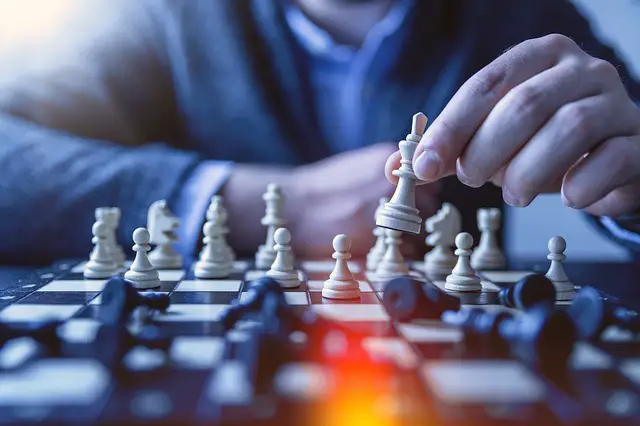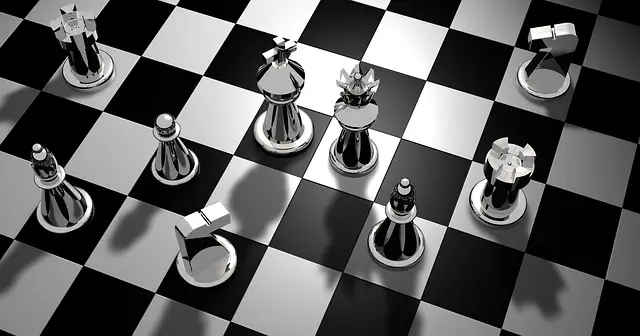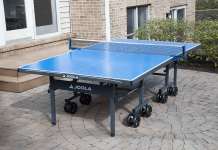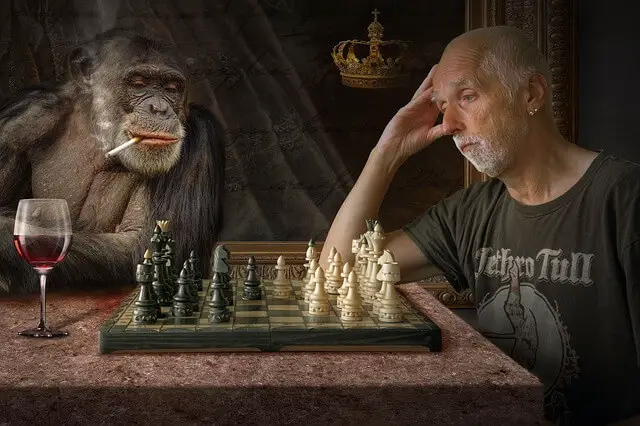Chess is a classic strategies game that will test your foresight, patience, strategic thinking, and ability to penetrate your opponent’s mind. The chess title of Grandmaster is the most prestigious award in the game of chess. Chess Players are taught who have shown excellent results at the highest levels and who have met FIDE rating requirements. Some of the great chess grandmasters of today have earned this title at a very young age. For example, World Champion Magnus Carlsen, Fabiano Caruana, Alireza Firuzja, Praggnanandaa, and Wesley So received the title of Grandmaster at the age of 15.
Grandmaster level is a coveted honor that takes many years for a player to earn. The degree is regulated by an international organization and requires you to meet competitive performance. Of the millions of chess players worldwide, just over 1,500 of today’s chess players have reached the height of a grandmaster.
Read More: Best Chess Sets under $100 Review
Table of Contents
How do you become a Chess Grandmaster?

It takes a lot of chess skills and attitude to become a great grandmaster. Here’s a quick rundown of the main issues:
Prepare for the opening
Grandmasters often play different openings or at least different lines within the opening system. Moreover, they are absolute connoisseurs of the openings played. They don’t just know the typical tactical plans, ideas, and models from their debut, also memorize many theories. They analyze their rules very deeply and often know their start to the middle of the games or even the end of the games.
Calculate Skills
It is almost impossible to play well without good calculation. Chess is a concrete game, and the better it is done, the more concrete it becomes. If you want to play at a very high level, you cannot rely on general concepts. Calculus is an area of the game where grandmasters tend to outperform average club players. Improved calculation methods (for example, look for forced gestures first, such as controls or handles) help organize the calculation. This allows you to calculate faster and more accurately.
Final skills
Grandmasters usually beat weaker opponents late in the game. Many club players find it much easier to play with less material. However, this is not the case. The last games are the area of the game where most of the club’s players fight. Grandmasters are familiar with the main theoretical endgames and many of the endgame basics. Other principles include Take Your Time, Equal Treatment; Kill the King and others. Here are some valuable chess tricks.
Focus
If you want to become a chess grandmaster, you have to be a professional. It is important to stay on the board all the time and focus on the game. Many regular club players prefer to leave their board quite often while playing to watch other games or talk to friends. To compete with such stronger players, a fighting spirit is needed. You additionally need a great deal of devotion at home. Playing at the grandmaster level starts with countless hours of chess at home. You must have a clear curriculum and be willing to do all the hard work.
Psychological Power
On the way to becoming a great chess master, you will have to endure many painful failures. You can be close to the GM standard and lose a big hand in the final round. Loss and failure are a pain. Only a few athletes can handle this. To become a grandmaster, you must develop an attitude that you will never give up.
Money
To wrap things up: turning into a grandmaster is costly. You need to buy more good chess cards, chess DVD series, and chess software. You have to pay for strong chess coaches and travel to tournaments. Usually, the necessary tournaments are far away. This can take time and take considerable financial resources.
Current Regulations to Become a Chess Grandmaster

The title of chess grandmaster is granted to chess players by the world chess federations FIDE. Besides being a world champion of chess, being a grandmaster is the greatest title that can be achieved in chess.
Other Official FIDE Titles: Candidate Master (CM), FIDE Master (FM), and International Master (IM). Many chess enthusiasts often use the colloquial name “super grandmaster” to refer to the best chess players in the world with over 2,700 ELO ratings.
When a player becomes a chess player, the ratings are maintained for life. There is a female players training program with lower requirements for women.
To procure the title of Grandmaster, chess players, for the most part, need to hold fast to the principles of globally noted competitions. The tournament must be at least eleven rounds with seven or more players, 80 percent or more being international grandmasters or international Masters. To fit the score for the GM standard, a player should meet the accompanying measures:
- A player must play at least 9 games in a tournament (with some exceptions, which you can read in the FIDE manual).
- The player must play the role of two men from different chess federations. (With few exceptions, you can read the FIDE manual).
- At least 50% of the player’s opponents must start. Also, at least 1/3 (at least 3 opponents) of the opponents must be grandmasters.
- The minimum rating requirement of the player’s opponents is 2380.
- The score of a player who wants to reach the GM standard must be at least 2600.
These 5 criteria are the most important that you must meet to achieve the GM standard. However, it should be noted that there are more detailed rules in the FIDE manual.
To receive the Grandmaster title, a player must generally acquire 3 GM rules (with a few exceptions). Also, at some point, your FIDE rating has to be higher than 2500 to become a Grandmaster.
With all the little details aside, it quickly becomes apparent that becoming a great chess player is very difficult. The following example shows this. If you get a hit of 2600 or higher on your opponent’s rating of 2380, it means you need to get at least 7 points in 9 games.
The Youngest Chess Grandmasters in the World
The record for the youngest Grandmaster currently belongs to former World Cup participant Sergei Karjakin. Sergei won the title of Grand Master at the age of 12 years and 7 months.
The second young Grandmaster is Nodirbek Abdusattorov from Uzbekistan, 13 years and 1-month-old. The third oldest Grandmaster is Parimarjan Negi, 13 years and 4 months old.
World chess champion Magnus Carlsen was only 5 days older than Nega when he became a grandmaster. That’s why he’s the fourth-youngest GM in the world.
What do these results look like?
One of the favorite books for the love of young people was the book of the famous Soviet great teacher Alexander Kotov’s “How to become a great teacher.” He was one of the best footballers of the mid-century, and his recommendations are certainly worth considering. Of course, reading this book wouldn’t be enough to earn you the highest title, but it can help you determine the direction you want to be headed.
According to the book, mastering chess is based on three things:
- Understanding of position.
- Tactical vision.
- Calculation skills.
But these are general terms; there are many other things in them. To properly understand a position, all strategic elements must be well known. This includes weaknesses, outposts, central control, unit activities, king’s security, and more. We should also not forget about more general things like positioning, planning, attack and defense, endgame strategies, etc.
To improve your understanding of the position, it is helpful to review the best players’ games, especially if they are following the directions.
Isaac Newton wrote in 1675: “If I look further, he is sitting on the shoulders of giants,” that is, he learned a lot from his predecessors. The same goes for chess; to become a great teacher, one must learn from previous generations.
Another necessary method is to play many long games and analyze them carefully. This way, you can identify your strengths and weaknesses and avoid repeating the same mistakes repeatedly. The third world champion, José Raúl Capablanca, once said: “You can learn a lot more from the game you lost than you can from the game you won. You have to lose hundreds of games before you can become a good gamer.
Tactical insights are very important and are usually trained by solving many puzzles. The calculation is slightly different from the tactical vision. For the latter, it is necessary to develop a tactical reconnaissance model. During the calculation, it’s more about visualizing the image, observing the various movements of the candidates, using preventive thinking, etc.
World Champion Garry Kasparov once said in his interview:
“No matter how much you count, it is important to look closely at the current situation.”
In other words, first, understand what to calculate and then research in that direction. Great teachers don’t charge everything; they only calculate what is needed for the calculation. Chess is a complex game that has become more specific since the days of Kotov. Masters who has the absolute right to play in the world championship candidates Tournament, or any player who replaces an absent contestant, earns at least a 50 percent score.
Nowadays, the machine plays much harder than a human, and chess players use it to prepare for openings. Some professionals only pay attention to the openings; you can spend hours and days analyzing different positions and preparing surprises at the beginning of the game.
But that doesn’t mean you have to do the same thing to become a great teacher. It just means that they are sure that they are already good enough at other aspects of chess: the higher your level, the more valuable the chess openings and vice versa.
Learn More: Chess Piece Values
Soft Skills for Chess
In addition to pure chess skills, one must also pay attention to the psychological and physical aspects.
Fitness is very important for chess players. As we already know, to become grandmasters, we have to play classical chess, that is, games with long controls. It’s a common story where a player ruins a great game by one simple mistake in the end, and poor physical condition may be the cause. Chess is a long game, and being in good physical condition can be your asset on your way to the title of Grand Master.
Psychology is extremely important in chess, and it’s not just about having the right attitude and motivation. The fourth world champion Alexander Alekhin admitted: “Chess developed my character. You can only become a chess grandmaster if you recognize your flaws and shortcomings as in life itself. “By setting goals for yourself and achieving them in chess, you can grow as a person too. It would help if you learned to overcome your fears, deal with stress, endure failure, and sleep well even after success.
How to Become a Chess Grandmaster: FAQs
What amount of time does it require to turn into a chess grandmaster?
According to sources, a dedicated individual between the ages of 8 and 12 is required to meet FIDE requirements for a Master’s Degree.
How much do good chess players win?
The average chess grandmaster makes $ 3,500 a month. However, if a grandmaster’s chess activity is based entirely on training, the average profit is $ 4,800 per month and Grandmasters who are not trained earn at least $ 2,500 a month.
How difficult will it be for a chess grandmaster?
Extremely difficult! The vast majority of people cannot do this no matter how long they play and study. There are 8,104 FIDE Masters (FM), 3,854 International Masters (IM), and 1,692 Grand Masters worldwide. Think about everything FM and IM did to graduate.
Conclusion
Talent is, of course, one of the importance of becoming a great chess master. One has to solve many puzzles and study, read a lot of books, play a lot, practice and analyze, and, perhaps more importantly, enjoy the process. However, this article should give you an idea of what it takes to become a great chess master and how long it will take. Good luck.

Veronica is a Green Bay-based freelance writer and editor with extensive experience with board games. When not busy scribbling her thoughts, you might find her in her garden, hiking out in the woods, or exploring new food joints.
Veronica is a die-hard board game and chess hobbyist by night. She likes to try out new games and is always on the lookout to recruit new players for her game night (so beware!). When not playing board games or throwing darts, she is usually busy painting miniatures (or doing other nerdy stuff).
She is the CEO & Content Writer of Indoor Games Zone. She shares her expertise from years of playing chess, board games, and darts.

![Stiga XTR Pro Review | 1,559+ Global Ratings (In-Depth Guide) [year] Stiga XTR Pro Review](https://indoorgameszone.com/wp-content/uploads/2021/08/Stiga-XTR-Pro-Review-218x150.jpg)






